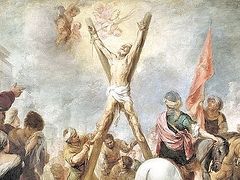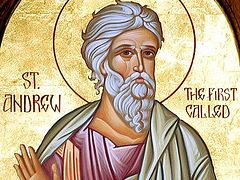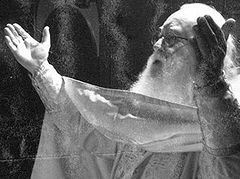
1. Holy Apostle Andrew the First Called, whose memory we celebrate today, is one of the twelve apostles. He was a fisherman from the town of Bethsaida. He was the first to follow Jesus Christ, and that is why he is named the “First Called”. He brought his brother, Simon Peter also to Christ. At the descent of the Holy Spirit on the apostles, St. Andrew preached faith in Christ on the shores of the Black Sea, passed through Pontus, Bithynia, and Iberia, and brought his preaching to Scythia (now Novorossia[1]). According to tradition, he reached Kiev and foretold that on the hills of Kiev and throughout those lands, the grace of God will shine. He founded a Church in Byzantium, over which he appointed Bishop Stachius. In about the year 62, he died on the cross in the city of Patras in Achaia.
Before his execution, when he saw the cross made at the orders of the proconsul of Achaia Egeat, in the form of the letter X (which would latter become known among Christians and the St. Andrew Cross), Holy Apostle Andrew joyfully exclaimed, “O good cross, long desired, passionately beloved, diligently sought, and now ready for the desiring soul! “I come to you calm and joyful—you, also, accept me with solemnity!” Thus did St. Andrew the First Called cry out, and considered it his great blessing to die in the horrors of the cross.
2. The holy apostle Andrew is the “example of a Christian’s spiritual joy”. At the sight of the terrible instrument of his torturous death—the cross—he not only did not fall into despondency or fear, but to the contrary greatly rejoiced that through the cross he can come to his Lord, into His blessed Kingdom.
And any Christian can always rejoice in the Lord (cf. 1 Thess. 5:16), in sorrows and in happiness, in sufferings and in prosperity, during life and at death.
What are the means by which we can maintain spiritual joy in ourselves?
a) The Joy about which we speak can be maintained in us first of all by timely reading of the word of God. A person rejoices when he find gold, silver, and other precious things. But the word of God makes the pious incomparably more joyful, strong, and alive. Prophet David experienced this himself. He said that the law of the Lord for him was more desired, more precious, more pleasant “than thousands of gold and silver” (Ps. 118:72). True, the law of God gladdens the soul. It exalts a person from earth to heaven, and allows not only the righteous but also the sinner to feel great spiritual consolation. The righteous man rejoices when he sees the love of God in Holy Scripture. The sinner is consoled when he sees in the Lord’s words the promise of God’s mercy for sinners who repent. How sweet to my palate are Thy sayings! More sweet than honey to my mouth, exclaims the king and prophet David (Ps. 118:103).
b) The second means by which we maintain spiritual joy is by going to God’s churches. This is so joyful for people who are even in the least pure of heart, that the thought alone of an upcoming opportunity to be in the Lord’s temple, to attend church services, makes their souls glad. This can be seen from the example of the royal prophet David: I was glad when they said unto me, ‘Let us go into the house of the Lord’' (Ps. 121:1). According to St. John Chrysostom, the visible temple of the Lord is the same as heaven. Because of this, in God’s temples divine grace is particularly at work, and when it touches our hearts, it disperses the wearisome gloom in our souls that attacks incessantly from somewhere, and brings down into the depths of our souls a new, bright ray of faith and hope in God’s mercy. In this way do the hearts of those who reverently attend prayers in church, who may not have been joyful when entering the church, become glad. And the joy of those God-loving participants in common worship, who had grace-fulled joy in their hearts even before entering God’s church, is strengthened and exalted.
b) The third means for maintaining spiritual joy is abstinance from unnecessary food and drink. Overeating and drunkenness darken the soul, weigh down the heart, and disturb the conscience, and therefore they deprive one of joy. But abstinence to the contrary helps to enlighten the mind, sanctify the will, the tame the passions, prevent us from sinning, and makes it possible for usto maintain joy in the soul. Even beyond this, it is easier for a temperate and sober person to preserve their own physical health, wealth, honor, and peace with his neighbors. And these blessings in life, as we know, also do much to help us preserve and prolong joy in our souls.
c) A further means for maintaining spiritual joy is prayer. The source of spiritual joy is God. Prayer brings us closer to God, and in coming closer to God, places us in a condition to easily draw spiritual joy from God. In prayerful closeness to God, are we happy? Our happiness is even more exalted from the thought of God’s good will toward us. Are we unhappy? Our unhappiness wanes from the thought that we might receive help from the Almighty Creator, Who said, Ask, and it shall be given to you (Mt. 7:7). And, Come unto Me, ye who labor and are heavy laden, and I shall give you rest (Mt. 11:13). Beyond this our prayers at home bring us nearer to God and allow us to feel His goodness, and stir up our love for Him. And where there is love for God, there is always abundant and ever increasing joy.
d) A means that is more convenient for many to maintain spiritual joy is mercy for the poor and misfortunate, which is revealed through alms or friendliness. This is the highest virtue. Jesus Christ required it of His followers more than anything else. Be ye merciful, the Savior said to His disciples, as your Father in heaven is merciful (Lk. 6:36). Therefore, mercy, as a virtue God especially loves, produces sweet feelings and quiet heavenly joy in the soul of a merciful Christian.
e) The strongest means for maintaining spiritual joy is the worthy partaking of the Holy Mysteries of the Body and Blood of Christ. This sacred substance is the light, life, and sweetest joy of the Christian soul. As a feather burns in the fire, so does all our woe perish in this Mystery, and our hearts as if melt, soften, are renewed, and are made indifferent to everything sinful while taking wing to all that is heavenly, meeting gladness everywhere, becoming triumphant and blessed. Glory to the merciful God Who has brought paradise to earth through this Mystery, and gives us in His mystical Body and Blood a sure means for wiping away all our bitterness, as well as an inexhaustible source of spiritual joy.
f) Finally, the final and most powerful means for maintaining spiritual joy in ourselves is the living idea of the blessedness of eternal life in the Kingdom of Christ our God—the means which inspired the holy martyrs and gave them the strength of their wondrous endurance in tortures for Christ.
“Just as the feeling of healthiness is inalienable from the healthy, so also is spiritual joy inalienable from those who live by the spirit and do not commit sins of the flesh,” says the great spiritual writer, Bishop Theophan [St. Theophan the Recluse]. This is the joy of the saved, who see clearly that they have avoided ruin. It can’t be inflated; it is born by itself and stands. The apostle’s commandment, Rejoice evermore (1 Thess. 5:16) is perhaps more of a sign, that if you do not rejoice, you are not standing in the ranks [of Christians].
According to Palladius of Hellenopolis in the Lausac History, in the monastery of Abba Appolos were up to 500 brothers, and they were always rejoicing, regardless of the great desert deprivations, and they rejoiced with such joy that no one here on earth could not see such joy and physical gladness. There was none amongst them who was bored or sad, and Abba Appolos usually said, “Those who are inheriting the Kingdom of Heaven should not sorrow upon the path of salvation. Let the pagan moan, let the Jews weep, let the sinners grieve. But those who are walking the right path should rejoice.” (Lausac History, 47, p. 168 [Russian])). (See Explanation of the Epistle to the Galations, Bishop Theophan, Moscow, 1875, p. 381 [Russian]).
3. Beloved brethren, let us make use of these means, which are sufficient for maintaining joy of the spirit in us. And let us give thanks to the Lord Who gives us joy and the means to maintain it and ascend higher in this joy, which is needed for the temporary and eternal happiness of our souls. Amen. (Compilation by Priest George Dyachenko from “Homilies and talks”, Archbishop Yakov of Nizhny Novgorod and Arzamas, 1853, with additions from the works of St. Theophan the Recluse as indicated.)



